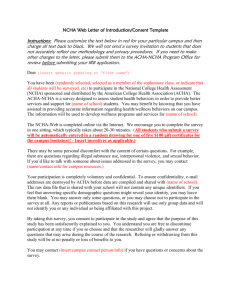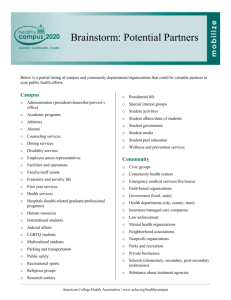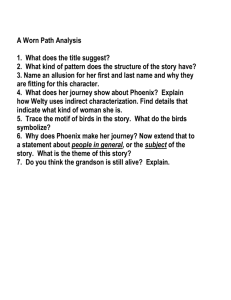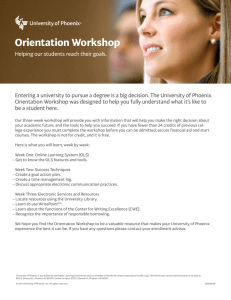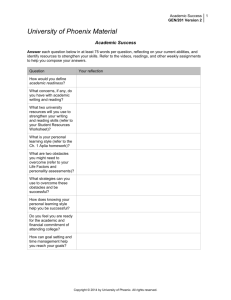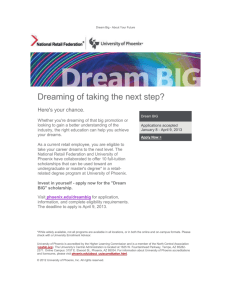presentation ( format)
advertisement
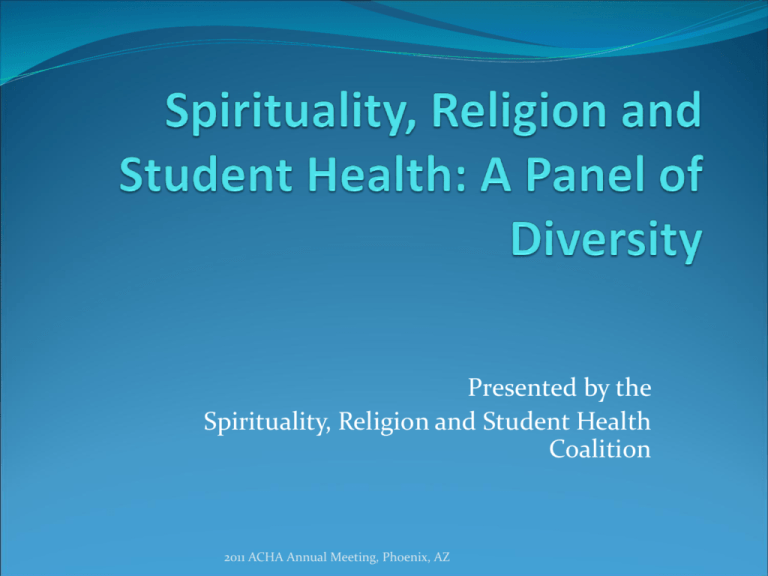
Presented by the Spirituality, Religion and Student Health Coalition 2011 ACHA Annual Meeting, Phoenix, AZ Panelists Paul Myers, Ph.D., University of Portland Michelle Harcrow, Ph.D., The University of Alabama Rev. Elizabeth Ritzman, L.C.P.C., Dominican University Rebecca Davis Mathias, Ph.D., Dominican University Kathleen Malara, MSN, FNP-BC, CTTS, Fordham University Alice Kimble, RN, BSN, MS, Bellarmine University Jo McGuffin, Ph.D., FACHE, Central Oklahoma University Sarah Faith Evans, MS, LPC, NCC, Stevenson University 2011 ACHA Annual Meeting, Phoenix, AZ Spirituality Religion and Student Health Coalition Coalition Goals, Charges, Activities From our ethics and ACHA Values Statement Invitation to get involved Today’s program: We are going to hear some data to inform the conversation and maybe challenge some assumptions We are going to hear 5 case studies Questions and Answers 2011 ACHA Annual Meeting, Phoenix, AZ Michelle S. Harcrow, Ph.D. 2011 ACHA Annual Meeting, Phoenix, AZ Religiosity & Spirituality among College Students 95% of adolescents believe in God 85 - 95 % report that religion is important in their life (Cotton, Zebracki, Rosenthal, Tsevat, & Drotar, 2006) 2008 HERI study of spirituality in higher education: 79 % of college students believe in God 66 % pray 40 % think that it is very important to follow religion every day (Astin, Astin, Lindhom, Bryant, Calderone, & Szelenyi, 2007; Myers & Kyle, 2008) 2011 ACHA Annual Meeting, Phoenix, AZ Definitions Religion/Religiosity is an organized system of beliefs, practices, rituals, and symbols designed (a) to facilitate closeness to the sacred or transcendent (God, higher power, or ultimate truth/reality) and (b) to foster an understanding of one’s relationship and responsibility to others in living together in a community. Spirituality is the personal quest for understanding answers to ultimate questions about life, about meaning, and about relationship to the sacred or transcendent, which may (or may not) lead to or arise from the development of religious rituals and the formation of community. Handbook of Religion & Health (Koenig, McCullough, & Larson, 2001) 2011 ACHA Annual Meeting, Phoenix, AZ Definition of Terms Religion Spirituality Community focused Individualistic (not always) Observable, measurable, objective Less visible & measurable, subjective Formal, orthodox, organized Less formal, less orthodox, less systematic Behavior oriented, outward practices Emotionally oriented, inward directed Authoritarian in terms of behaviors Not authoritarian, little accountability Doctrine separating good from evil Unifying, not doctrine oriented From Koenig, McCullough, & Larson (2001) 2011 ACHA Annual Meeting, Phoenix, AZ Religiosity Positive relationships found between religion/spirituality and health investigation of chronic disease prevention Mental health & general well-being host of other health issues lower mortality rates (McCullough et al., 2000; Koenig et al., 1999). 8 years longer life expectancy compared to those who never attended church (Hummer et al., 1999; Idler et al., 2003). Religion has been shown to be a significantly positive contribution to end-of-life events (Koenig et al., 2001). 2011 ACHA Annual Meeting, Phoenix, AZ Spirituality Nontheistic sanctification Ascribing divine significance and character to objects such as the human body Holy, blessed, or sacred College students show high degree of spiritual interest & involvement 8 in 10 students believe in God and attend religious services Great deal of comfort & security from their spiritual/religious beliefs 2011 ACHA Annual Meeting, Phoenix, AZ Religiosity & Spirituality Research Complex, Multidimensional constructs Characterized by individual attitudes, beliefs, values, experiences, and behaviors (Ellison & Levin, 1998). Specify each dimension being measured : multiple measures are stronger than using single indicators More descriptive approach creating subscales of measurement & Theoretical distinction: Categories: Behavioral, Subjective, and Functional 2011 ACHA Annual Meeting, Phoenix, AZ Personal Research Relationships between physical activity levels, dietary fat intake, and how factors of religiosity and spirituality influence these behaviors among college students. Social support was also be included in the study as a control variable. Social Support was significantly related to Moderate & Vigorous physical activity Behavioral Religiosity & Functional Religiosity had weak significant relationships with Dietary Fat Intake. 2011 ACHA Annual Meeting, Phoenix, AZ Future Research Investigation of religiosity and spirituality constructs Exploration of more comprehensive dietary measures Application of theoretical framework Mixed methods – quantitative and qualitative 2011 ACHA Annual Meeting, Phoenix, AZ Dominican University: Staff Bioethics Consult o Student Sexual Health Founded by Sinsinawa Dominicans (Roman Catholic) 4,000 Students, Undergraduate, Graduate, Professional; Private Liberal Arts Suburban Chicago Incoming Students Religious Preference: 62% Catholic, 13% “None”, 10% other Christian Faculty Trends: Younger, More Diverse, More Liberal Rev. Elizabeth Ritzman, Director, Wellness Center Rebecca Davis Mathias, Ph.D., Director, Center for Global Peace through Commerce; Consulting Ethicist, Alexian Brothers Health 2011 ACHA Annual Meeting, Phoenix, AZ System ERD Anxiety, NOS: Expectations for Practice Improvement Although we expect to practice within them, the Ethical and Religious Directives were anxiety provoking and only marginally familiar to staff. Religiously diverse multidisciplinary team of 10 (APN, RN, Psy.D, LCSW, interns) differed on understanding and usage. Conflict Avoidance: Chilling effect on the provider-patient collaboration when clinical issues overlapped the directives . Open forum discussion exacerbated ERD anxiety and staff differences. Expected to gain familiarity and competence with using the ERDs To develop a common understanding about how each discipline uses ERDs To fully support the student in engaging in ethical decision-making To relieve avoidance of ethical and moral issues with patients To eliminate the coded language about sexual health in and around our Wellness Center and clarify on campus what we do for sexual health. 2011 ACHA Annual Meeting, Phoenix, AZ Structure and Timeline for Consultation Sept-November: Director Conducted Research – Literature Review and Sourcing; Interviewing Consultants November: Planning Meeting with Consultant January: 2 hour Director-Consultant Training February-2 hour Consultant-Nursing Staff Workshop March-2 hour Consultant Counseling Staff Workshop 3 hour Whole Staff Cases Consultation April- Surveyed Staff for Outcomes May – 1 hour Meeting to Review Outcomes 2011 ACHA Annual Meeting, Phoenix, AZ Outcomes Familiarity : 16.7% were familiar with the ERDs, 37% were partially familiar Comfort level: improved from 33% to 77% over the consult Competence: moved from 22% to 77% 44% rated consult design effective 22% partially effective Quotes: I have at times remained silent or avoided ERD related questions or issues and now I am much more comfortable speaking to them with clients and colleagues. …Knowing the purpose of the ERDs will help me feel more assured about my responding to ethical issues by giving the client space to explore, process, and consider options I do not believe the consultation will significantly change my practice. It seemed that a lot of what she was telling us we already do as a matter of good social work or psychologist ethics. Being able to engage an ethics consultant would be good. 2011 ACHA Annual Meeting, Phoenix, AZ U2 and Fordham University 2011 ACHA Annual Meeting, Phoenix, AZ Fordham University A UNIVERSITY A CATHOLIC UNIVERSITY A JESUIT UNIVERSITY A UNIVERSITY IN NEW YORK CITY 2011 ACHA Annual Meeting, Phoenix, AZ TENETS CURA PERSONALIS UNITY OF HEART AND MIND MEN AND WOMEN FOR AND WITH OTHERS MAGIS: STRIVING FOR EXCELLENCE OVERARCHING PRICIPLES STUDENT CENTERED ROLE MODELING COMMITMENT TO MISSION 2011 ACHA Annual Meeting, Phoenix, AZ MISSION Providing holistic health care related to the health and wellness of the University community and to assist each member in being a productive member of society. Assisting students with the identification and management of their own health care needs. Provide educational and prevention programs related to health and wellness to the University community throughout the academic year. Interact with the University community and help each individual student grow and mature while at Fordham University. 2011 ACHA Annual Meeting, Phoenix, AZ Impact of Tenets and Mission in a Secular World Religious Diversity Women’s Empowerment Groups LGBTQ Health Care Reform Political Groups 2011 ACHA Annual Meeting, Phoenix, AZ Student Health Services Mission Our mission also involves supporting the academic community’s goal of excellence through education, personal and community integrity and self-respect. We also aim towards assisting our students in developing moral and ethical values and characters that reflect the Jesuit tradition in regards to health promotion and illness prevention. These learned ideologies will enable each student to incorporate these skills achieved into their lives, their families and to the service of others now and in the future. 2011 ACHA Annual Meeting, Phoenix, AZ Bellarmine University 2011 ACHA Annual Meeting, Phoenix, AZ Bellarmine University Established 1950 Approximately 3,000 undergrad students; 2,000 graduate Student population diversity: 46% Catholic 23% Baptist, Independent Christian, Non-Denominational Christian, Pentecostal 7% Mainline Protestant (Episcopal, Methodist, Lutheran, Presbyterian, Disciples) .25% Orthodox Christian .6% Jewish .4% Muslim .27% Unitarian .23% Buddhist 22% No preference, Unknown, or Other 2011 ACHA Annual Meeting, Phoenix, AZ Healthcare Issues in Faith-Based Institutions When staff, faculty and students are employed with or attend a faith-based institution but do not identify themselves with that faith, there will always be issues. Balance being part of the education mainstream and holding to the policies of their religion. Even within the Catholic religion there is a lot of diversity because in understanding and interpretation differences. What should these institutions allow that is contradictory to their policies? Should faith based institutions receive federal funds if they do not offer contraceptive services for employees? How ‘welcoming’ are faith based institutions obligated to be with students/staff/faculty that do not practice their faith? 2011 ACHA Annual Meeting, Phoenix, AZ Recent History of Bellarmine University A ‘private university based on Catholic values’. Bellarmine’s Mission: “Bellarmine encourages and celebrates people of all faiths.” “Contraception is not healthcare, but a lifestyle choice”. Lifestyle choices 2011 ACHA Annual Meeting, Phoenix, AZ Student Quotes: Student quotes: “You all go out of your way to accommodate ‘lifestyles’ – vegetarian food options, services to celebrate other religions holidays, a gay lesbian organization -- but refuse to offer condoms, which I and many others see as a basic health necessity. Why is your lifestyle choice the ‘right’ one? You shouldn’t pick and choose what you will welcome and what you will not. You should either welcome all of us or just let Catholics in.” “Bellarmine is Catholic and all policies should reflect that. If you don’t like it, you do not have to attend here.” “I am not Catholic, but I would think it very narrow minded to judge Catholicism based only on their recent history of pedophiles and protecting them; I know there is also a lot positive in the Catholic religion. Yet I feel this is what Catholics do when they completely denounce Planned Parenthood, when that organization does so much good.” 2011 ACHA Annual Meeting, Phoenix, AZ What can we do? Efforts to expand knowledge and understanding Encourage administration to be clear on policies Know your own comfort level 2011 ACHA Annual Meeting, Phoenix, AZ What can we do? Efforts to expand knowledge and understanding Encourage administration to be clear on policies Know your own comfort level 2011 ACHA Annual Meeting, Phoenix, AZ Chair Steering Committee Director, University Health Services Data Analysis Work Group James Allen Establishes performance measures; processes, analyzes, and disseminates data Programming Work Group Rachelle Franz Identifies, plans, implements, & evaluates programs and events collaboratively with various groups. Policy Work Group Sunshine Cowan Identifies, proposes, and processes approved policy changes related to health promotion Liaison for UCOSA, Administration, Athletic Advisory Council & Faculty Senate Director, Sports & Recreation Communications & Public Relations Employee Wellness Christy Vincent Johnny Watley Guides overall communications and public relations efforts. Assists others to tailor type and scope of messaging and disseminates information. Coordinates voluntary population specific healthy campus initiatives – integrating assistance of healthy campus process functions for employee wellness health programs. 2011 ACHA Annual Meeting, Phoenix, AZ Spiritual Wellness Network Emily Blaess Serves as a s resource & referral network to be accessed in promoting health and wellness. Serves to assist organizations wanting to provide services and programs, related to spiritual wellness, to navigate through the University systems. • Spirituality • Spiritual Quest • Equanimity • Religious Commitment • Religious Engagement • Religious Struggle / Skepticism • Charitable Involvement • Compassionate Self- Concept •Ethic of Caring •Ecumenical Worldview 2011 ACHA Annual Meeting, Phoenix, AZ • Wellness Center Mission - to assist in the development of life skills necessary to enhance personal levels of wellness and increase the ability to be successful in various areas of life. •UCO Healthy Campus utilizes the Dimensions of Wellness (physical, mental, intellectual, social, spiritual, and environmental) conceptual framework which promotes wellness as largely determined by the decisions one makes to be able to live life fully – with vitality and meaning. •Transformative Learning is a holistic process that places students at the center of their own active and reflective learning experiences. All students at UCO will have transformative learning experiences in five core areas: leadership; research, creative and scholarly activities; service learning and civic engagement; global and cultural competencies; and health and wellness. 2011 ACHA Annual Meeting, Phoenix, AZ Spiritual Wellness Network Serves as a resource and referral network to be accessed in promoting health and wellness to those who desire their lives to be consonant with their deeper values and perceptions of the meaning of life Serves to assist organizations wanting to provide services and programs, related to spiritual wellness, navigate through the university systems. 2011 ACHA Annual Meeting, Phoenix, AZ Sarah 2011 ACHA Annual Meeting, Phoenix, AZ Questions and Answers Say where you are from and what person you would like to answer your question. 2011 ACHA Annual Meeting, Phoenix, AZ Dominican University References United States Conference of Catholic Bishops, Ethical and Religious Directives for Catholic Health Care Services, Fifth Edition, http://www.usccb.org/meetings/2009Fall/docs/ERDs_ 5th_ed_091118_FINAL.pdf Catholic Health Alliance of Canada, Health Ethics Guide, http://www.chac.ca/resources/ethics/docs/discernme nt.pdf Catholic Health Association: chausa.org/HCEUSA Health Care Ethics USA, a quarterly newsletter jointly published by the Center for Health Care Ethics at Saint Louis University and CHA available online. 2011 ACHA Annual Meeting, Phoenix, AZ Bellarmine Bibliography Cardinal Newman Society: A public conscience for Catholic higher education www.cardinalnewman.org Catholics for Choice: Serves as a voice for Catholics who believe that the Catholic tradition supports a woman’s moral and legal right to follow her conscience in matters of sexuality and reproductive health.www.catholicsforchoice.org Ruling: College wrong to not cover birth control. Valerie Schmalz Our Sunday Visitor, August 30, 2009 www.osv.com Labeling birth control ‘preventative medicine’ could make contraception free for US women. Ricardo Alonso-Zaldivar Chicago Tribune October 31, 2010 www.chicagotribune.com Conservative Catholic College rejects Birth Control. David Neipert , November 11, 2009 Huffington Post Living www.huffingtonpost.com 2011 ACHA Annual Meeting, Phoenix, AZ
![Advanced Practice Clinicians Section 2014 []](http://s2.studylib.net/store/data/005266347_1-e47bbdee2346242f6ff85363ec775d6a-300x300.png)
